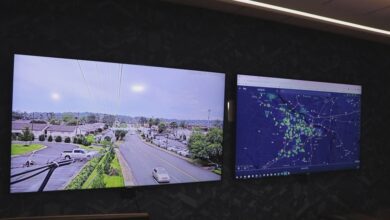Microsoft’s AI deal under federal investigation

Andrej Sokolow/dpa/AP
The Microsoft logo can be seen at the headquarters of the software company.
Washington
CNN
—
The Federal Trade Commission is investigating a recent Microsoft deal with artificial intelligence startup Inflection, according to a person familiar with the matter, as US antitrust regulators ramp up scrutiny of the red-hot AI industry.
The investigation comes as antitrust officials at the FTC and the Justice Department are nearing final agreement this week on how to jointly oversee AI giants such as Microsoft, Google, Nvidia, OpenAI and others, two people familiar with the matter told CNN.
That agreement, which could be finalized within days, would appoint DOJ as the lead investigator of Nvidia, while the FTC would take responsibility for investigating Microsoft and OpenAI, the people said. DOJ will likely continue its role in overseeing Google, one of the people indicated. Any investigations would focus on whether the companies have used their dominant positions in the AI industry to harm competition through abusive and illegal behavior.
The FTC probe into Microsoft, meanwhile, concerns whether the company’s investment in Inflection constituted an acquisition that Microsoft failed to disclose to the government, one of the people said.
In March, Microsoft announced it had hired Inflection’s co-founders and a number of its staff to lead its Copilot program, and Inflection said its AI model would be hosted on Microsoft’s cloud platform. As part of that deal, Microsoft was said to have paid $650 million to Inflection.
Microsoft, Inflection and Google didn’t immediately respond to a request for comment; Nvidia and OpenAI declined to comment. The DOJ and FTC declined to comment. The FTC-DOJ agreement was earlier reported by The New York Times; the FTC’s Microsoft probe was earlier reported by The Wall Street Journal.
The US agencies’ division-of-labor agreement opens the door to more intensive probes of a sector that has energized investors, enthralled consumers and raised alarm bells among critics who say AI urgently needs regulation to forestall widespread job displacement, discrimination and fraud.
And it highlights how enforcers are increasingly trying to bring existing laws to bear on the industry as prospects for new US laws governing AI have dimmed. The United States is widely viewed as a laggard on AI regulation as others such as the European Union have leapfrogged it with tough rules about how the technology can be used in high-risk contexts.
Nvidia’s soaring stock prices have served as a barometer of the AI frenzy, underscoring the company’s position as a leading supplier of computing chips necessary for training advanced AI models. On Wednesday, Nvidia became the second-largest publicly traded company in the United States, ending the day with a market capitalization of more than $3 trillion and edging out Apple.
For years, technology critics and regulators have worried that major tech companies may be monopolizing entire sectors of the economy. That has led to high-profile US government antitrust suits targeting Amazon, Apple, Google, Meta and Microsoft.
Some fear that tech companies could abuse their powerful roles in business and society to extend their dominance into the fast-growing field of generative AI, which exploded onto the scene in 2022 when OpenAI released ChatGPT.
“AI relies on massive amounts of data and computing power, which can give already-dominant firms a substantial advantage,” DOJ antitrust chief Jonathan Kanter said last week in a speech at Stanford University. “Powerful network effects may enable dominant firms to control these new markets.”
One way for tech giants to wield anticompetitive influence in the AI sector, critics say, is through exclusive partnerships with AI startups. The agreements can potentially “lock in” AI developers as customers of large cloud computing services and give the tech giants significant stakes or influence over the development of AI. Those types of deals, including Microsoft’s relationship with OpenAI, are the subject of an ongoing study by the FTC announced in January.
FTC Chair Lina Khan has warned in op-eds and congressional testimony that, left unchecked, artificial intelligence could “turbocharge” fraud and scams. The agency has published numerous reminders and warnings that businesses can be held liable for making misleading claims about their AI tools or for covertly using consumer data to train AI models. The FTC is currently investigating Reddit’s AI content licensing practices, and is separately investigating OpenAI for possible violations of consumer protection law.
The DOJ has also become increasingly vocal on AI issues. In 2022, the agency’s antitrust division hired Susan Athey, a Stanford University professor and AI expert, to be its chief economist.
In looking at competition in the AI industry, antitrust enforcers should take lessons on how technology giants have behaved anticompetitively in the past, Athey told CNN at a recent event in Washington hosted by Bloomberg News.
That could include gatekeeping or bottlenecking tactics, making it harder for consumers or customers to switch providers, or becoming the biggest buyer of key supplies — such as AI chips, for example — and denying those necessary supplies to competing rivals.
“We should look back to historical analogues and see where sources of market power have been and how people have preserved them, and those are the kinds of tactics we might worry about going forward,” Athey said.
This story has been updated with additional context and developments.



